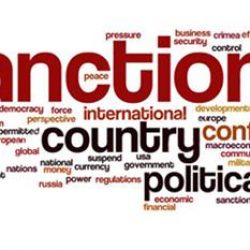(Adopted on 1987)
Section 78 Period of Limitation
(3) To the extent that prosecution is subject to a statute of limitations, the period of limitation shall be:
1. thirty years in the case of acts punishable by imprisonment for life;
2. twenty years in the case of acts punishable by a maximum term of imprisonment of more than ten years;
3. ten years in the case of acts punishable by a maximum term of imprisonment of more than five years but not more than 10 years;
4. five years in the case of acts punishable by a maximum term of imprisonment of more than one year but not more than five years;
5. three years in the case of other acts.
Section 108b Bribery of Voters
(1) Whoever offers, promises or furnishes another gifts or other benefits for not voting or for voting in a particular manner, shall be punished with imprisonment for not more than five years or a fine.
(2) Whoever requests, is promised or accepts gifts or other benefits in exchange for not voting or voting in a particular manner, shall be similarly punished.
Section 108e Bribery of Members of Parliament
(1) Whoever undertakes to buy or sell a vote for an election or ballot in the European Parliament or in a parliament of the Federation, the Lands, municipalities or municipal associations, shall be punished with imprisonment for not more than five years or a fine.
(2) Collateral to imprisonment of at least six months for a crime pursuant to subsection (1), the court may deprive the person of the capacity to attain public electoral rights, and the right to elect or vote in public matters.
Section 129 Formation of Criminal Organizations
(1) Whoever forms an organization, the objectives or activity of which are directed towards the commission of crimes, or whoever participates in such an organization as a member, recruits for it or supports it, shall be punished with imprisonment for not more than five years or a fine.
(2) Subsection (2) shall not be applied:
1. if the organization is a political party, which the Federal Constitutional Court has not declared to be unconstitutional;
2. if the commission of crimes is only an objective or activity of minor significance; or
3. to the extent that the purposes or activity of the organization relate to crimes under Sections 84 to 87.
(3) An attempt to form an organization indicated in subsection (1) shall be punishable.
(4) If the perpetrator is one of the ringleaders or supporters or there exists an especially serious case, then imprisonment from six months to five years shall be imposed.
(5) The court may dispense with punishment under subsections (1) and (3) in the case of participants whose guilt is slight or whose involvement is of minor significance.
(6) The court may in its discretion mitigate the punishment (Section 49 subsection (2)) or dispense with punishment under these provisions if the perpetrator:
1. voluntarily and earnestly makes efforts to prevent the continued existence of the organization or the commission of a crime consistent with its goals; or
2. voluntarily discloses his knowledge to a government agency in time, so that crimes, the planning of which he is aware, may still be prevented; if the perpetrator attains his goal of preventing the continued existence of the organization or if it is attained without his efforts, then he shall not be punished.
Section 299 Taking and Offering a Bribe in Business Transactions
(1) Whoever, as an employee or agent of a business, demands, allows himself to be promised, or accepts a benefit for himself or another in a business transaction as consideration for giving a preference in an unfair manner to another in the competitive purchase of goods or commercial services, shall be punished by imprisonment for not more than three years or a fine.
(2) Whoever, for competitive purposes, offers, promises or grants an employee or agent of a business a benefit for himself or for a third person in a business transaction as consideration, for his giving him or another a preference in an unfair manner in the purchase of goods or commercial services, shall be similarly punished.
Section 300 Especially Serious Cases of Taking and Offering a Bribe in Business Transactions
In especially serious cases an act under Section 299 shall be punished with imprisonment from three months to five years. An especially serious case exists, as a rule, if:
1. the act relates to a benefit of great magnitude; or
2. the perpetrator acted professionally or as a member of a gang which has combined for the continued commission of such acts.
Section 331 Acceptance of a Benefit
(1) A public official or a person with special public service obligations who demands, allows himself to be promised or accepts a benefit for himself or for a third person for the discharge of a duty, shall be punished with imprisonment for not more than three years or a fine.
(2) A judge or arbitrator who demands, allows himself to be promised or accepts a benefit for himself or a third person in return for the fact that he performed, or would in the future perform a judicial act, shall be punished with imprisonment for not more than five years or a fine. An attempt shall be punishable.
(3) The act shall not be punishable under subsection (1), if the perpetrator allows himself to be promised or accepts a benefit which he did not demand and the competent public authority, within the scope of its powers, either previously authorizes the acceptance, or the perpetrator promptly makes a report to it and it authorizes the acceptance.
Section 332 Taking a Bribe
(1) A public official or person with special public service obligations who demands, allows himself to be promised or accepts a benefit for himself or for a third person in return for the fact that he performed or would in the future perform an official act, and thereby violated or would violate his official duties, shall be punished with imprisonment from six months to five years. In less serious cases the punishment shall be imprisonment for not more than three years or a fine. An attempt shall be punishable.
(2) A judge or an arbitrator, who demands, allows himself to be promised or accepts a benefit for himself or for a third person in return for the fact that he performed or would in the future perform a judicial act, and thereby violates or would violate his judicial duties, shall be punished with imprisonment from one year to ten years. In less serious cases the punishment shall be imprisonment from six months to five years.
(3) If the perpetrator demands, allows himself to be promised or accepts a benefit in return for a future act, then subsections (1) and (2) shall already be applicable if he has indicated to the other his willingness to:
1. violate his duties by the act; or
2. to the extent the act is within his discretion, to allow himself to be influenced by the benefit in the exercise of his discretion.
Section 333 Granting a Benefit
(1) Whoever offers, promises or grants a benefit to a public official, a person with special public service obligations or a soldier in the Federal Armed Forces, for that person or a third person, for the discharge of a duty, shall be punished with imprisonment for not more than three years or a fine.
(2) Whoever offers promises or grants a benefit to a judge or an arbitrator, for that person or a third person, in return for the fact that he performed or would in the future perform a judicial act, shall be punished with imprisonment for not more than five years or a fine.
(3) The act shall not be punishable under subsection (1), if the competent public authority, within the scope of its powers, either previously authorizes the acceptance of the benefit by the recipient or authorizes it upon prompt report by the recipient.
Section 334 Offering a Bribe
(1) Whoever offers, promises or grants a benefit to a public official, a person with special public service obligations, or a soldier of the Federal Armed Forces, for that person or a third person, in return for the fact that he performed or would in the future perform an official act and thereby violates or would violate his official duties, shall be punished with imprisonment from three months to five years. In less serious cases the punishment shall be imprisonment for not more than two years or a fine.
(2) Whoever offers, promises or grants a benefit to a judge or an arbitrator, for that person or a third person, in return for the fact that he:
1. performed a judicial act and thereby violated his judicial duties; or
2. would in the future perform a judicial act and would thereby violate his judicial duties,
shall be punished in cases under number 1 with imprisonment from three months to five years, in cases under number 2 with imprisonment from six months to five years. An attempt shall be punishable.
(3) If the perpetrator offers, promises or grants the benefit in return for a future act, then subsections (1) and (2) shall already be applicable if he attempts to induce the other to:
1. violate his duties by the act; or
2. to the extent the act is within his discretion, to allow himself to be influenced by the benefit in the exercise of his discretion.
Section 335 Especially Serious Cases of Taking or Offering Bribes
(1) In especially serious cases:
1. an act under:
a) Section 332 subsection (1), sent. 1, also in conjunction with subsection (3); and
b) Section 334 subsection (1), sent. 1, and subsection (2), respectively also in conjunction with subsection (3), shall be punished with imprisonment from one year to ten years; and
2. an act under Section 332 subsection (2), also in conjunction with subsection (3), shall be punished with imprisonment for not less than two years.
(2) An especially serious case within the meaning of subsection (1) exists, as a rule, when:
1. the act relates to a benefit of great magnitude;
2. the perpetrator continuously accepts benefits which he demanded in return for the fact that he would perform an official act in the future; or
3. the perpetrator acts professionally or as a member of a gang which has combined for the continued commission of such acts.
(3) To the extent that prosecution is subject to a statute of limitations, the period of limitation shall be:
1. thirty years in the case of acts punishable by imprisonment for life;
2. twenty years in the case of acts punishable by a maximum term of imprisonment of more than ten years;
3. ten years in the case of acts punishable by a maximum term of imprisonment of more than five years but not more than 10 years;
4. five years in the case of acts punishable by a maximum term of imprisonment of more than one year but not more than five years;
5. three years in the case of other acts.
Section 108b Bribery of Voters
(1) Whoever offers, promises or furnishes another gifts or other benefits for not voting or for voting in a particular manner, shall be punished with imprisonment for not more than five years or a fine.
(2) Whoever requests, is promised or accepts gifts or other benefits in exchange for not voting or voting in a particular manner, shall be similarly punished.
Section 108e Bribery of Members of Parliament
(1) Whoever undertakes to buy or sell a vote for an election or ballot in the European Parliament or in a parliament of the Federation, the Lands, municipalities or municipal associations, shall be punished with imprisonment for not more than five years or a fine.
(2) Collateral to imprisonment of at least six months for a crime pursuant to subsection (1), the court may deprive the person of the capacity to attain public electoral rights, and the right to elect or vote in public matters.
Section 299 Taking and Offering a Bribe in Business Transactions
(1) Whoever, as an employee or agent of a business, demands, allows himself to be promised, or accepts a benefit for himself or another in a business transaction as consideration for giving a preference in an unfair manner to another in the competitive purchase of goods or commercial services, shall be punished by imprisonment for not more than three years or a fine.
(2) Whoever, for competitive purposes, offers, promises or grants an employee or agent of a business a benefit for himself or for a third person in a business transaction as consideration, for his giving him or another a preference in an unfair manner in the purchase of goods or commercial services, shall be similarly punished.
Section 300 Especially Serious Cases of Taking and Offering a Bribe in Business Transactions
In especially serious cases an act under Section 299 shall be punished with imprisonment from three months to five years. An especially serious case exists, as a rule, if:
1. the act relates to a benefit of great magnitude; or
2. the perpetrator acted professionally or as a member of a gang which has combined for the continued commission of such acts.
Section 331 Acceptance of a Benefit
(1) A public official or a person with special public service obligations who demands, allows himself to be promised or accepts a benefit for himself or for a third person for the discharge of a duty, shall be punished with imprisonment for not more than three years or a fine.
(2) A judge or arbitrator who demands, allows himself to be promised or accepts a benefit for himself or a third person in return for the fact that he performed, or would in the future perform a judicial act, shall be punished with imprisonment for not more than five years or a fine. An attempt shall be punishable.
(3) The act shall not be punishable under subsection (1), if the perpetrator allows himself to be promised or accepts a benefit which he did not demand and the competent public authority, within the scope of its powers, either previously authorizes the acceptance, or the perpetrator promptly makes a report to it and it authorizes the acceptance.
Section 332 Taking a Bribe
(1) A public official or person with special public service obligations who demands, allows himself to be promised or accepts a benefit for himself or for a third person in return for the fact that he performed or would in the future perform an official act, and thereby violated or would violate his official duties, shall be punished with imprisonment from six months to five years. In less serious cases the punishment shall be imprisonment for not more than three years or a fine. An attempt shall be punishable.
(2) A judge or an arbitrator, who demands, allows himself to be promised or accepts a benefit for himself or for a third person in return for the fact that he performed or would in the future perform a judicial act,and thereby violates or would violate his judicial duties, shall be punished with imprisonment from one year to ten years. In less serious cases the punishment shall be imprisonment from six months to five years.
(3) If the perpetrator demands, allows himself to be promised or accepts a benefit in return for a future act, then subsections (1) and (2) shall already be applicable if he has indicated to the other his willingness to:
1. violate his duties by the act; or
2. to the extent the act is within his discretion, to allow himself to be influenced by the benefit in the exercise of his discretion.
Section 333 Granting a Benefit
(1) Whoever offers, promises or grants a benefit to a public official, a person with special public service obligations or a soldier in the Federal Armed Forces, for that person or a third person, for the discharge of a duty, shall be punished with imprisonment for not more than three years or a fine.
(2) Whoever offers promises or grants a benefit to a judge or an arbitrator, for that person or a third person, in return for the fact that he performed or would in the future perform a judicial act, shall be punished with imprisonment for not more than five years or a fine.
(3) The act shall not be punishable under subsection (1), if the competent public authority, within the scope of its powers, either previously authorizes the acceptance of the benefit by the recipient or authorizes it upon prompt report by the recipient.
Section 334 Offering a Bribe
(1) Whoever offers, promises or grants a benefit to a public official, a person with special public service obligations, or a soldier of the Federal Armed Forces, for that person or a third person, in return for the fact that he performed or would in the future perform an official act and thereby violates or would violate his official duties, shall be punished with imprisonment from three months to five years. In less serious cases the punishment shall be imprisonment for not more than two years or a fine.
(2) Whoever offers, promises or grants a benefit to a judge or an arbitrator, for that person or a third person, in return for the fact that he:
1. performed a judicial act and thereby violated his judicial duties; or
2. would in the future perform a judicial act and would thereby violate his judicial duties, shall be punished in cases under number 1 with imprisonment from three months to five years, in cases under number 2 with imprisonment from six months to five years. An attempt shall be punishable.
(3) If the perpetrator offers, promises or grants the benefit in return for a future act, then subsections (1)and (2) shall already be applicable if he attempts to induce the other to:
1. violate his duties by the act; or
2. to the extent the act is within his discretion, to allow himself to be influenced by the benefit in the exercise of his discretion.
Section 335 Especially Serious Cases of Taking or Offering Bribes
(1) In especially serious cases:
1. an act under:
a) Section 332 subsection (1), sent. 1, also in conjunction with subsection (3); and
b) Section 334 subsection (1), sent. 1, and subsection (2), respectively also in conjunction with subsection (3),shall be punished with imprisonment from one year to ten years; and
2. an act under Section 332 subsection (2), also in conjunction with subsection (3), shall be punished with imprisonment for not less than two years.
(2) An especially serious case within the meaning of subsection (1) exists, as a rule, when:
1. the act relates to a benefit of great magnitude;
2. the perpetrator continuously accepts benefits which he demanded in return for the fact that he would perform an official act in the future; or
3. the perpetrator acts professionally or as a member of a gang which has combined for the continued commission of such acts.















 We will not leak your personal information
We will not leak your personal information